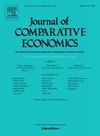Bureaucracy-business relationship, corruption and the implications for marketization
Abstract
This paper employs a novel game-theory model to characterize the impact and the resulting welfare implications of a corrupt relationship in the marketization process in an economy with weak institutions. This relationship between a bureaucrat and a domestic firm enables the bureaucrat to share part of the domestic firm’s gain generated by the bureaucrat’s imposition of barriers to deter the entry of foreign firms. When the barrier has an upper bound and both the bureaucrat and the foreign firm have sufficient knowledge regarding the domestic firm’s cost information, the equilibrium level of the barrier would first equal the upper bound and then decrease with the domestic firm’s cost. This result is robust regardless of whether the cost of the domestic firm and the foreign firm are positively correlated or independent. The welfare loss is largest in industries where a firm’s cost relies heavily on its private advantage: e.g., innovation-intensive industries, and when the domestic firm has a relatively large cost disadvantage. This paper provides novel and insightful implications for marketization in countries with weak institutions.

 求助内容:
求助内容: 应助结果提醒方式:
应助结果提醒方式:


